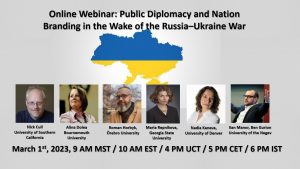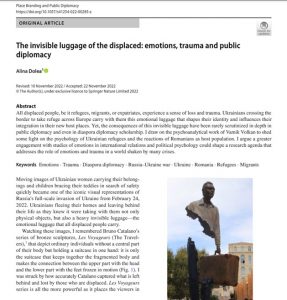On Tuesday 12th September BU’s Women’s Academic Network is hosting an online talk by Dr Sara Jones and Dr Natalia Kogut from the University of Birmingham. Dr Jones and Dr Kought will be sharing preliminary findings from their research on mismatched expectations and the impact of “Eastern Europeanism” on the experiences of displaced Ukrainian women in UK.
For more information, and to sign up to attend, please follow the link: https://www.eventbrite.co.uk/e/mismatched-expectations-the-impact-of-eastern-europeanism-tickets-689148891887?aff=oddtdtcreator
Background information:
After the start of the war in Ukraine, a significant number of Ukrainian refugees came to Britain, most through the ‘Homes for Ukraine’ scheme that matched refugees with British hosts. They were given shelter and access to social services; however, they faced a number of unexpected challenges in their life in the UK. This paper explores those challenges in the context of Britain as a “post-Cold War” space (Chari and Verdery, 2009). In particular, it considers how “three worlds ideology” continues to impact on British attitudes towards migrants and refugees from Central, East and Southeast Europe and the ways in which Ukrainians encounter life in the UK. The talk is based on a series of narrative interviews with Ukrainians living in the UK and Kogut’s own experience as a Ukrainian fleeing war. On the one hand, there is recognition among the interview participants that refugees from Ukraine have been privileged in comparison to those coming from countries once considered in the “third world”, and that there is a sense of the “closeness” of the UK and Ukraine as European countries. Yet, on the other, interviewees report how they were confronted with an understanding of them as residents of a backward or “second world” country with little to offer – a form of prejudice that has been termed “Eastern Europeanism” (Kalmar, 2022). In turn, the UK’s sense of itself as a “first world”, developed country, is frequently called into question by Ukrainian encounters with the UK’s systems and services, including poor access to medical services, lack of social housing and shortage of school places. We will introduce our policy report Support for Displaced Ukrainians – The Role of History and Stereotypes, including our recommendations for those seeking to support Ukrainians in the areas of work/benefits, housing and hosting, healthcare and language. Speaker Biographies Sara Jones is Professor of Modern Languages at the University of Birmingham. Her research focuses on the cultural, social and political processes of memory, especially memory of socialism and post-socialism in Germany and Central, Eastern and Southeastern Europe. She is author of three monographs, most recently Towards a Collaborative Memory: German Memory Work in a Transnational Context (Berghahn, 2022). She is currently Principal Investigator for the AHRC-funded project Post-Socialist Britain? Memory, Representation and Political Identity amongst German, Polish and Ukrainian Immigrants in the UK. Natalia Kogut is a Postdoctoral Research Associate at the University of Birmingham, working on the projects Post-Socialist Britain? Memory, Representation and Political Identity amongst German, Polish and Ukrainian Immigrants in the UK and Futures of Ukraine: Youth, Mobility and Post-War Reconstruction. Natalia holds a PhD in Law from the Institute of State and Law, V. Korezkiy of NAS (Ukraine). Natalia’s research interests include the human right to life and health, healthcare systems, ecological law, migrants’ rights, and historical memory of migrants. She is a specialist in human rights, right to health, and comparative analyse of health care systems.
For related readings please see this link













 Dr. Ashraf cited on ‘Modest Fashion’ in The Guardian
Dr. Ashraf cited on ‘Modest Fashion’ in The Guardian NIHR-funded research launches website
NIHR-funded research launches website Academics write for newspaper in Nepal
Academics write for newspaper in Nepal New paper published on disability in women & girls
New paper published on disability in women & girls Global Consortium for Public Health Research 2025
Global Consortium for Public Health Research 2025 MSCA Postdoctoral Fellowships 2025 Call
MSCA Postdoctoral Fellowships 2025 Call ERC Advanced Grant 2025 Webinar
ERC Advanced Grant 2025 Webinar Horizon Europe Work Programme 2025 Published
Horizon Europe Work Programme 2025 Published Horizon Europe 2025 Work Programme pre-Published
Horizon Europe 2025 Work Programme pre-Published Update on UKRO services
Update on UKRO services European research project exploring use of ‘virtual twins’ to better manage metabolic associated fatty liver disease
European research project exploring use of ‘virtual twins’ to better manage metabolic associated fatty liver disease